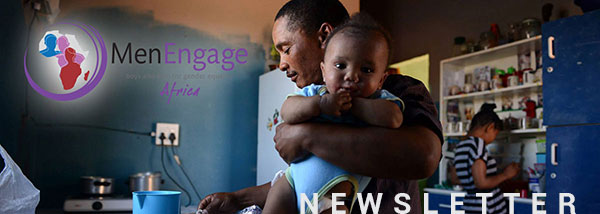 |
|
|
March 2016
|
|
 Sport in the equation to challenge GBVRecognising the power of sport to unite communities around an agenda or a cause, MenEngage Botswana, used soccer to spread the message denouncing gender-based violence and to promote gender justice during last year’s 16 Days of Activism for No Violence against Women and Children.
“This year, MenEngage Botswana decided to use sport as a social change driver and organised a friendly soccer Cup tournament where Botswana’s biggest and influential teams from the districts of Gaborone and Lobatse – Extension Gunners and Township Rollers – competed in the inaugural Unity Cup challenge in aid of eradicating gender-based violence”, said Theresa Baitsile, MenEngage Botswana’s media officer.
“The game’s objectives were to mobilise awareness around gender-based violence (GBV) through sport, to create community ambassadors to end GBV through sensitising the players of two of Botswana’s biggest football teams, increasing community dialogue on GBV and emphasising positive masculinities through sport in the public media and mainstreaming gender equality and ending GBV through the huge following that soccer has”, she added.
The Unity Cup challenge was the first of its kind and MenEngage Botswana has plans to make it an annual event where all the soccer clubs of Botswana will participate.
|
|
 MenEngage Africa annual meeting took place in HarareOn 26th November 2015, two days into the 16 Days of Activism for No Violence against Women and Children campaign, which forms the very essence of the intent and focus of the MenEngage Africa alliance, we began our two-day annual general meeting in Harare, Zimbabwe. All of our 20 alliance partners attended. In his opening remarks at the meeting, Bafana Khumalo, co-chair of the alliance, reminded partners that the meeting was taking place at a time when some parts of Africa were experiencing serious political conflict.
“The work that we do around gender justice is grossly affected and undermined by political conflicts that take place in various parts of the continent. We cannot extricate ourselves from the political unrest that some of our countries experience as these have a direct impact on the work that we do”, he said.
“During times of conflict, women and girls often bear the brunt of abuse, and that makes our work political, Khumalo continued.
Julio Langa, also co-chair of the alliance, pointed out that he has an “expectation that the meeting would be used as an occasion to discuss some of the internal and strategic challenges that we have within our network”.
|
|
 MenEngage Africa partners agree new commitments to end GBVFollowing the last annual general meeting all MenEngage Africa network partners agreed to five key commitments. High up on the list is the resolve to challenge African governments to promote peaceful and non-violent resolutions in Mozambique, Burundi, DRC and any other African country that is in conflict.
|
 MenEngage Africa & Sonke address men’s low uptake of HIV services at ICASAMenEngage Africa and Sonke Gender Justice attended the 18th International Conference on AIDS & STIs in Africa (ICASA), which was held in Harare, Zimbabwe, in December 2015. Together, we hosted a side event on World AIDS Day (1 December 2015) focusing on men’s low uptake of HIV services. While HIV disproportionately affects women and girls and, as a result it is said that HIV has the face of a woman, men are more likely to die from HIV-related causes. It is estimated that 70% of all AIDS-related mortality occurs amongst men.
|
.jpg) More of our engagements at ICASABeyond the Men and HIV dialogue which we hosted, we had an extensive programme which included the following:
On the 30th of November, Itumeleng Komanyane, who manages the MenEngage Africa alliance, moderated a pre-conference side event organised in partnership with SAfAIDS. Titled “Tides of Change, the session focused on empowering the youth for HIV prevention. MORE DETAILS HERE
Mphokuhle Mabhena, a senior trainer with MenEngage Africa, gave a poster presentation on “The role of religion in socialising youth and their sexuality”, while Mabel Sengendo-Nabaggala, co-ordinator of the alliance’s work in the Africa region, gave an abstract presentation with the title “Engaging men in strengthening the implementation of gender-based violence (GBV) laws as HIV prevention strategy in Kenya, Rwanda and Sierra Leone.” MORE DETAILS HERE
MenEngage Africa was also one of many organisations who had a stall at the Community Village. Visitors to the stall had a chance to interact with our friendly staff to learn about the work that we do with men and boys to promote gender equality and justice, HIV and human rights in the Africa region. VIEW GALLERY HERE
///
|
 “Why do men marry little girls?”At a SAfAIDS-led session on gender transformation which MenEngage Africa participated in all women, men, girls and boys agreed on several important recommendations in order to tackle the issue of child marriage.
They agreed that there is a need to uphold and respect both girls and boys, and boys and girls need to have equal and quality education. They also agreed that culture and religion should not be used as a justification for men to marry young girls.
Furthermore, economic empowerment of women is crucial and men should not be under pressure to be the sole providers.
|
 Hiding in Plain Sight: GBV and Working with Men and Boys“Why is it critical to work with men and boys (to address gender-based violence)? Men may be the majority of the perpetrators, but we have a larger segment of men who do not condone this violence but are silent about it, and we often miss out on the opportunity to engage them. We cannot design a preventative intervention without equally focusing on and working with the perpetrators”, writes Yeabsira Bogale of MenEngage Ethiopia and a member of MenEngage Africa’s Youth Alliance.
|
|

